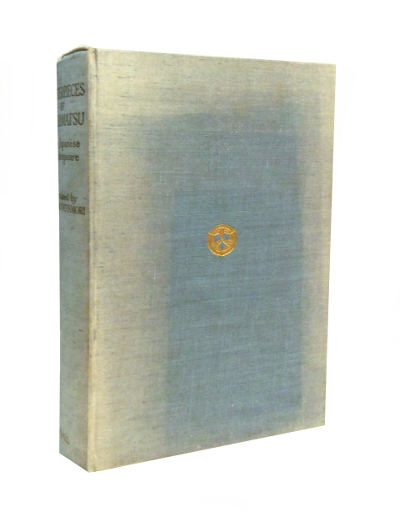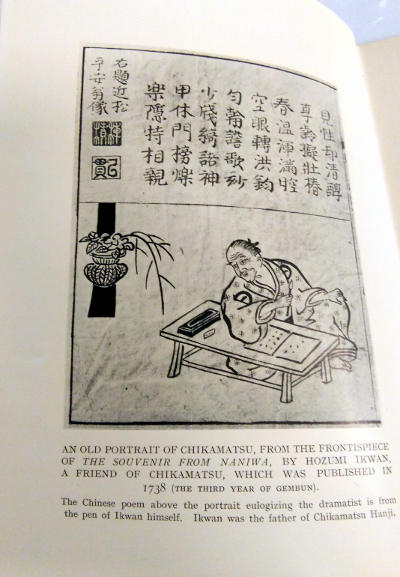Chikamatsu Monzaemon (1653 – 6 January 1725) was a Japanese dramatist of jōruri, the form of puppet theater that later came to be known as bunraku, and the live-actor drama, kabuki. The Encyclopædia Britannica has written that he is “widely regarded as the greatest Japanese dramatist”. His most famous plays deal with double-suicides of honor bound lovers.
Chikamatsu was born Sugimori Nobumori to a samurai family. There is disagreement about his birthplace. In those days, doctors who served the daimyōs held samurai status. But Chikamatsu’s father lost his office and became a rōnin, a masterless samurai. At some point in his teens, between 1664 and 1670, Chikamatsu moved to Kyoto with his father where he served for a few years as an obscure page for a noble family, but other than that, little is known about this period of Chikamatsu’s life. He published his first known literary work in this period, a haiku that appeared in 1671. After serving as a page, he next appears in records of the Gonshō-ji (近松寺) temple (long suggested as the origin of his pen name “Chikamatsu”, which is kun reading of 近松) in Ōmi Province, in present-day Shiga Prefecture.
With the production in 1683 of his puppet play in Kyoto about the Soga brothers (The Soga Successors or “The Soga Heir”; Yotsugi Soga), Chikamatsu became known as a playwright. The Soga Successors is believed to have been Chikamatsu’s first play although sometimes 15 earlier anonymous plays are contended to have been by Chikamatsu as well. Chikamatsu also wrote plays for the kabuki theatre between 1684 and 1695, most of which were intended to be performed by a famous actor of the day, Sakata Tōjūrō (1647–1709). After 1695, and until 1705, Chikamatsu wrote almost exclusively Kabuki plays, and then he abruptly almost completely abandoned that genre. The exact reason is unknown, although speculation is rife: perhaps the puppets were more biddable and controllable than the ambitious kabuki actors, or perhaps Chikamatsu did not feel kabuki worth writing for since Tōjūrō was about to retire, or perhaps the growing popularity of the puppet theater was economically irresistible.
In 1705, Chikamatsu became a “Staff Playwright” as announced by early editions of The Mirror of Craftsmen of the Emperor Yōmei. In 1705 or 1706, Chikamatsu left Kyoto for Osaka, where the puppet theater was even more popular. Chikamatsu’s popularity peaked with his domestic plays of love-suicides, and with the blockbuster success of The Battles of Coxinga in 1715, but thereafter the tastes of patrons turned to more sensational gore fests and otherwise more crude antics; Chikamatsu’s plays would fall into disuse, so even the actual music would be lost for many plays. He died January 6, 1725, in either Amagasaki in Hyōgo, or Osaka.





